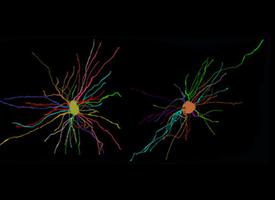
Astrocytes help coordinate communication
between neurons. The one on the left is
derived from a healthy brain and the one on
the right is from an individual diagnosed
with schizophrenia.
New research has identified the culprit behind the wiring problems in the brains of people with schizophrenia. When researchers transplanted human brain cells generated from individuals diagnosed with childhood-onset schizophrenia into mice, the animal’s nerve cell networks did not mature properly and the mice exhibited the same anti-social and anxious behaviors seen in people with the disease.
“The findings of this study argue that glial cell dysfunction may be the basis of childhood-onset schizophrenia,” said University of Rochester Medical Center (URMC) neurologist Steve Goldman, M.D., Ph.D., co-director of the Center for Translational Neuromedicine and lead author of the study which appears today in the journal Cell. “The inability of these cells to do their job, which is to help nerve cells build and maintain healthy and effective communication networks, appears to be a primary contributor to the disease.”